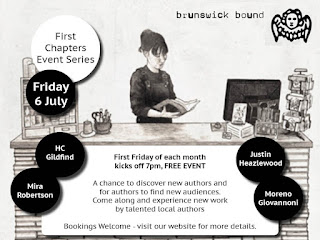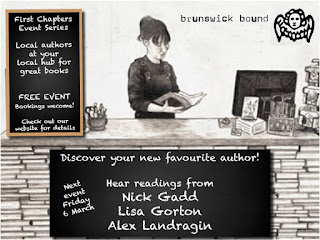First Chapters Q&A with Roger Averill
Roger Averill is a Brunswick based author who also works as a freelance researcher and editor.
Roger will be reading from Relatively Famous (published by Transit Lounge) at our First Chapters event on Friday 1 June.
 We asked Roger some general bookish questions because we were interested in finding out more about him and this is what he had to say.
We asked Roger some general bookish questions because we were interested in finding out more about him and this is what he had to say.
 We asked Roger some general bookish questions because we were interested in finding out more about him and this is what he had to say.
We asked Roger some general bookish questions because we were interested in finding out more about him and this is what he had to say.
1.
Brunswick Bound has asked you to read a chapter from your published work at First Chapters.
Tell us what we can expect from the chapter you have chosen?
Tell us what we can expect from the chapter you have chosen?
I
think I’ll read from Chapter 6. This is where the narrator, Michael Madigan,
meets his father’s would-be biographer. This chapter deals with a couple of the
book’s key themes, namely the way we can never really escape our parents’
influence, and the fraught allure of literary biography.
2.
What kind of books do you write?
RelativelyFamous is my second novel. In addition to those two books, I’ve also
published a travel memoir (Boy He Cry: An Island Odyssey) and a
biography (Exile: The Lives and Hopes of Werner Pelz).
3.
What was the first book that you read (or had read to you) that left an
impression on you?
I
have a clear memory of my parents and my grandmother repeatedly reading The
Three Little Pigs to me. I think it was one of those Ladybird Books from
the ‘60s. I’ve no idea why I liked it so much, though as a narrative it’s got a
bit going for it: danger, suspense, a villain who eventually gets his
comeuppance, the reassuring sense of safety and security, order restored. If
only I’d imbibed its conservative subtext and invested in Brunswick
4.
Do you believe that books should answer life’s big questions?
Growing
up, raised by Methodists, the answer was always to be found in the Good Book,
and on some subconscious level I’ve never really lost that expectation, the
hope that the next book I read will be the One, the one that changes
everything. Perhaps that’s why I write them, too. Certainly, I write them in an
attempt to assert meaning on the world. I also think that the very form of books,
or stories at least, mimic the way we make sense of our lives. That is, that
our senses of self are predominantly narrative, that we come to understand who
we are through the stories we tell about ourselves.
5.
What’s your go-to solution for writer’s block?
Fortunately I’ve never suffered from it, so whatever I have
to say about it probably isn’t terribly helpful. To keep up the house-made-of-bricks
theme –which, strangely, is echoed in Relatively Famous – I’ve always
thought of writing as being like laying bricks: each word a brick, every
sentence another row, each chapter a wall in the house you are building. When
you get stuck, just lay another brick. One of my great-grandfathers, William
Richard Averill, was a bricklayer, so perhaps my approach to writing comes from
him!
I’ve
a tendency to construct ‘this, though that’ sentences. For example: ‘I’ve no
idea why I liked it so much, though as a narrative …’ The curse of the liberal
mind, perhaps, always looking to give both sides of the argument.
7.
What do you put down as your occupation when asked?
‘Teacher.’
If it’s in conversation and I feel the need to make myself sound more
interesting or I have a desire for the person doing the asking to know me a
little, ‘teacher’ would be followed by a self-conscious explanation of my
writing life. If they haven’t already drifted off in search of better company,
I’ll then bore them by talking about the distinction between ‘occupation’ and
‘vocation’ (another theme running through Relatively Famous).
8.
What is the question that you hope never to be asked in an author Q&A?
‘How
would you describe your writing?’ I’ve already had this one, and cheated by
quoting what reviewers have said about it.
9.
What question do you hope you will be asked and why?
I
like being asked about who has helped me in my ‘writing journey’, because I can
then pay tribute to my friend Chris Eipper, who started reading and editing my
work 30 years ago. Chris taught me that writing is a craft that has to be
constantly honed.
10.
Which book that you have read do you think should be better known or more
widely read?
There
are so many, but I’ll go with Mark Slouka’s brilliant coming-of-age novel Brewster.
It’s a sensitive and superbly written book about those troubled teenage years.
I could equally recommend his book of essays Essays from the Nick of Time:
Reflections and Refutations. His politics and sensibility are in sync with
mine, and he writes in a direct and accessible way, with bristling
intelligence.




Comments
Post a Comment